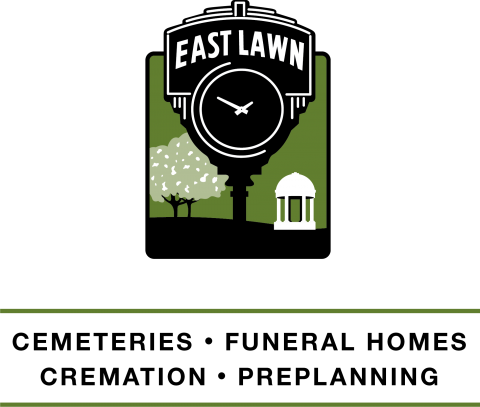Subscribe to our Newsletter!
 East Sacramento Preservation
East Sacramento Preservation- Community Meeting Announcement—Major East Sacramento Development 05/17/2025
- Tree Planting Season Wrap-Up at McKinley Park 04/13/2025
- 🌳 Volunteers Needed for McKinley Park Tree Planting! (March 29)🌳 02/19/2025
- East Lawn Memorial Park Guided Historic Walking Tours 02/08/2025
- 20 Is Plenty Lawn Sign Available 02/04/2025
Tag Archives: HJ
New Hiram Johnson Principal
Before literature and history, there were stories, and in some cultures, even now, stories are the literature and history. Dr. Kal Phan, principal of Hiram Johnson High School, comes from such a culture and has his own story—a tale of war, privation and dauntless endurance. Ultimately, it’s a story of triumph. For Phan his story informs his mission at Hiram Johnson. “I am committed to stay at Hiram Johnson to continue to build on the dramatic positive changes that we have made in the past six years. I want the community to know about our excellent teachers and programs and the changes we’ve made.”
The Hiram Johnson story most Sacramento parents hear is that it’s a poorly administered, neglected high school with low test scores, an underserved student population, discipline problems, demoralized faculty and staff and crumbling infrastructure. School Board Trustee Ellen Cochrane says, “Johnson is the designated High School for the 95819 and 95816 zip codes but parents don’t want to send their kids there because of its reputation and the stories they’ve heard. But the true story is that the discipline, programs and student life have changed 180 degrees. HJ is not the fabled lowest-of-the-low school in Sacramento. It’s undergoing a renaissance. People don’t know that it teaches Mandarin, French, Spanish and ASL, runs a student led community tax return program out of its Corporate Business Academy or has tens of thousands of dollars in scholarships awarded to its students every year. Dr. Phan and the staff of HJ are creating these changes and many, many others.”
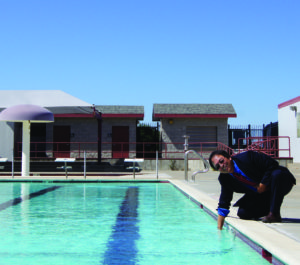 Phan, 51, is no stranger to challenge. He was born in a Mien village in a remote mountain of Laos during the middle of the U.S. supported Secret War in Laos in 1965. He grew up in a preliterate subsistence-farming world where school did not exist. When communists invaded his village in 1967, he and his family escaped to another village in Northern Laos. They walked through the jungle for almost a month. They had to escape again when the communists took over all of Laos in 1975. They had to escape at night walking for four hours from their mountain village to the Mekong River to cross to Thailand. They walked silently through the jungle with only one flashlight to avoid being seen or heard by the enemy soldiers. As they crossed the Mekong River, they could see flashlights from the communist soldiers trying to locate their boat to shoot. After they reached Thailand, they were housed in a refugee camp for four years. He worked in the tobacco field watering the tobacco plants with a bucket to earn 50 cents a day.
Phan, 51, is no stranger to challenge. He was born in a Mien village in a remote mountain of Laos during the middle of the U.S. supported Secret War in Laos in 1965. He grew up in a preliterate subsistence-farming world where school did not exist. When communists invaded his village in 1967, he and his family escaped to another village in Northern Laos. They walked through the jungle for almost a month. They had to escape again when the communists took over all of Laos in 1975. They had to escape at night walking for four hours from their mountain village to the Mekong River to cross to Thailand. They walked silently through the jungle with only one flashlight to avoid being seen or heard by the enemy soldiers. As they crossed the Mekong River, they could see flashlights from the communist soldiers trying to locate their boat to shoot. After they reached Thailand, they were housed in a refugee camp for four years. He worked in the tobacco field watering the tobacco plants with a bucket to earn 50 cents a day.
The tough and uncertain beginnings did not end when the family came to the USA. When Phan, who could neither read nor write, arrived in Montgomery, Alabama in 1975, the baffled principal placed him in the third grade at 15 years old. Over the summer Phan completed fourth and fifth grade and was bumped up to the sixth grade the next year. While making huge academic strides, the immigrants faced the uglier side of the United States. Some Alabamans didn’t welcome the Mien. One family woke one night to a ring of burning crosses.
But one Alabaman, a school administrator named Ms. Bumpers, told him: “You’re a good boy. You have to go to college.” He did not at the time know what college was, but he would remember her words forever.
Next, his family moved to the Richmond, California ghetto. The communist soldiers and the KKK were dangerous, but so was the hood of Richmond. Thirteen people lived in the house there; three of his three sisters and grandparents slept in the garage. Racist people threw eggs and tomatoes at their door. Thieves broke into their house and car to steal things. The family couldn’t afford to turn on the hot water, so Phan didn’t have a hot shower for the first four years of his life in America.
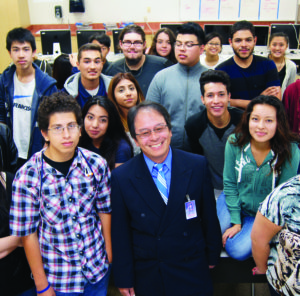 His education in Alabama had given him meager skills in English and in Richmond he continued to absorb the language along with the multiple, unending culture shocks. At Richmond High School a Vietnamese girl read aloud the daily bulletin. This struck him: if she could be such an integral part of the school community, maybe he could as well. He told his counselor what Ms. Bumpers had said about college, and the counselor enrolled him in the student help program, Upward Bound.
His education in Alabama had given him meager skills in English and in Richmond he continued to absorb the language along with the multiple, unending culture shocks. At Richmond High School a Vietnamese girl read aloud the daily bulletin. This struck him: if she could be such an integral part of the school community, maybe he could as well. He told his counselor what Ms. Bumpers had said about college, and the counselor enrolled him in the student help program, Upward Bound.
The eldest son in his family, he was determined to apply himself. He focused on his English, his studies, and modeled achievement for his four younger sisters and brother. He did well in high school, and was accepted as pre-med and engineering program in many colleges. He chose U.C. Berkeley solely because the campus was close to his family.
In college he focused on Ethnic Studies and Asian American Studies. He became a leader as member of the chancellor appointed Asian Task Force and helped form the first Laotian student organization on campus. He became the first Mien person to graduate from a major U.S. university in 1985. Miss Bumpers was right.
Phan met his destiny and greatest challenges through education. He became the first Mien teacher in the U.S. in 1990. This meant more schooling. In 1998 he received his Masters in Educational Leadership from CSU East Bay and finished his Doctorate of Education at Mills College in 2015. Education had uplifted and liberated him, and he put himself in a position to help others rise. He became an assistant principal in 1998 and principal in 2004 in Richmond. He helped lead two high schools and a middle school to dramatic improvements.
Recruited to come to Sacramento in 2007, he served as an Assistant Principal at Kennedy High School, then as an Assistant Principal at Hiram Johnson High School from 2010-2015. Now as the Principal at Hiram Johnson, he becomes the first Laotian high school principal in the U.S. He represents a beacon of hope for Mien, Hmong Lao and other Laotians in America. He confronts a challenge that will define his leadership and possibly restore the reputation of the school.
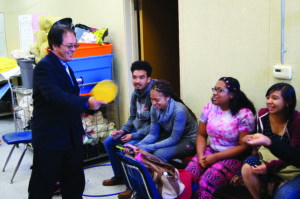 Phan’s efforts to transform Hiram Johnson have already begun. Under his purview student suspensions have plummeted from 724 in 2009 to 274 last year, and falling. There is no gang presence allowed on campus and fights, once a daily occurrence, are rare. These changes occurred while Phan was an assistant principal and continue today.
Phan’s efforts to transform Hiram Johnson have already begun. Under his purview student suspensions have plummeted from 724 in 2009 to 274 last year, and falling. There is no gang presence allowed on campus and fights, once a daily occurrence, are rare. These changes occurred while Phan was an assistant principal and continue today.
Phan’s path to the job has not been problem free. Some teachers and community members were not pleased with the lack of full community involvement in his hiring. Phan was chosen using the interim appointment process with minimal community input. District administration vetted Phan using his success as interim principal at HJ, assistant principal and principal at prior schools and district administrator as the litmus test. Ten-hour days, personal commitment, unwavering determination and a willingness to learn are in Phan’s favor. He is eager to move towards reconciliation with a staff that has suffered many setbacks from a string of problematic administrators.
But there is no denying the winds of change. Michael Washington the Law Academy Lead Instructor marvels at the metamorphosis of Hiram Johnson, “People tell me I didn’t know you have a Law Academy or Corporate Business Academy. They were told negative stories about the campus but when they come and see they’re excited about what we’re doing and our programs. This is a completely different campus from 10 years ago.”
A pillar of Phan’s work centers on parent and the community involvement with the school. He has developed a Parent Center and sponsors parent involvement workshops. These steps are vital. The school should not be an alien institution, but part of a student’s expanding family. Hence Phan has recruited staff members who are fluent in Spanish, Hmong, Mien, Chinese and Vietnamese and presided over an increase of teachers and staff contacting parents. He personally attends local Hmong, Mien and Lao community and private family functions. He’s also built relationships with businesses near the school. In all these efforts we can see the merging of family and school, a lowering of barriers and a positive uptick in communication. With outreach like this the community itself begins to advocate for the school.
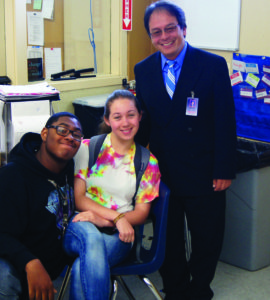
The next step for HJ is to catch the attention of the Midtown, Elmhurst, Tahoe Park and East Sac Parents who believe the old stories, says Board Member Cochrane. “I’ve had parents announce ‘my child will never go there.’ They haven’t seen the academic transformation. They don’t know what’s going on. For me, I have one important job to do—help Dr. Phan build a community coalition to support Hiram Johnson’s transformation. The work has started. I wouldn’t be surprised to see HJ be a blue ribbon school in the near future.”
Cochrane states, “Dr. Phan is working to make Hiram Johnson a great Sacramento school. He’s raised academic standards and wants them to climb even higher. His phenomenal personal story embodies an ideal for education that we all share: it should be available, for free, to everyone, and our public schools should care for our kids, should lift them up and move them ahead. He’s tackling every problem from the campus facility repairs to high quality programs, equity and student culture. His dream is to give children a better future.”
At Hiram Johnson, Kal Phan works to realize his dream. At every step on his journey, he says, “there was somebody who recognized something in me, and supported me. Our kids need that.”
Posted in Essays
Tagged city schools, Hiram Johnson, HJ, Kal Phan, Sac City Schools, Sacramento City School, schools, scusd
Comments Off on New Hiram Johnson Principal
















 Subscribe In A Reader.
Subscribe In A Reader. Check Us Out On Facebook!
Check Us Out On Facebook! Check Us Out On Twitter!
Check Us Out On Twitter! Visit Nextdoor!
Visit Nextdoor!





